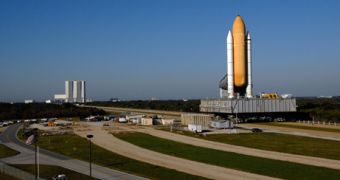A few hours before the launch, scheduled for 4:31 pm EST, engineers completing a final check up of the space shuttle Atlantis spotted a sensor glitch, or a possible problem with the fuel indicator gauges that show the level of fuel in the shuttle's external tank. As a result, the launch has been delayed until today at 4:09 pm EST when they will attempt a second liftoff, if they manage to solve the problem they have spotted yesterday.
These sensors represent a critical component of the cutoff system of the three main engines, and ensure that they do not shut down too early or too late during the liftoff phase. NASA protocol allows the shuttle to clear the launch pad during a liftoff if one of the three sensors fails. In this case, two of the sensors were found to be faulty, and the liftoff procedure was stopped. According to Paul Foerman, a spokesperson for NASA, the indicating gauges that show the level of fuel in the external tank kept showing that the tank was full even when they were commanded to show that it was empty.
Similar problems with the same indicating gauges have been responsible for mission delays in the past, and NASA officials say that this problem might be related to bad wiring and connectors, rather that the sensors, but they didn't say how repairs might be done.
Even though NASA hoped they would achieve an on-time liftoff and all the missions this year performed remarkable departures, trouble seems to be in their ways ever since the tragedy of the space shuttle Columbia in 2003.
European Space Agency officials have been somehow disappointed with Atlantis' performance, as the agency spent over $2 billion in 22 years to develop the space module Columbus, which will be flown to the International Space Station. The European module will be the second laboratory to be connected to the ISS after Destiny in 2001, and the first that will be docked to the 'bridge' module Harmony, which has been installed last month. It will be closely followed by the Japanese laboratory Kibo in February next year, if the current schedule is respected.
Work on the Columbus will begin almost immediately, and will start with a crew of three astronauts, that will be completed with another three in the course of next year.
However, though the space shuttle program and the space station went relatively well since the 2003 disaster, the planing and development of the ISS has been delayed for years at a time, which eventually contributed to Columbus' grounding.

 14 DAY TRIAL //
14 DAY TRIAL //